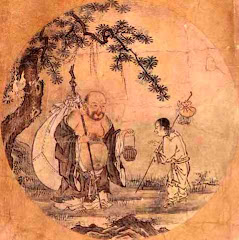
Gautam Buddha's cousin-brother, Devadatta, was very jealous of Gautam Buddha and his enlightenment, and his thousands of disciples. He was a very intellectual man himself, and he became a disciple of Gautam Buddha in the hope that Gautam Buddha would choose him as his successor. First, he was Gautam Buddha's cousin-brother, very close; secondly, he was as intelligent as you can hope a person to be -- very erudite, very scholarly.
Time went on and Buddha started becoming old. Finally one night Devadatta told him, "It is time you should declare the name of your successor because you are getting old. Without a successor your disciples will break apart into small groups after your death."
Buddha said, "Do you have somebody in mind?"
Devadatta was in much difficulty. He had not thought that this was going to be the case, but he was very ambitious, so finally -- although he was feeling embarrassed -- he said, "Yes, I offer myself. I belong to the same family; our blood is the same and I have grasped everything that you have said. I can represent you perfectly well, and I don't think anybody else can be a competitor to me."
Buddha said, "The very idea is egoistic. I can only choose someone who has never thought about being chosen, who is so innocent that he could not even think of it. Certainly you cannot be my successor, so forget all about it."
Buddha came one morning, and as usual a crowd had gathered, many people were waiting to listen to him. But one thing was unusual -- he was carrying a flower in his hand. Never before had he carried anything in his hand. People thought that someone must have presented it to him. Buddha came, he sat under the tree. The crowd waited and waited and he would not speak. He wouldn't even look at them, he just went on looking at the flower. Minutes passed, then hours, and the people became very much restless.
It is said that Mahakashyap couldn't contain himself. He laughed loudly. Buddha called him, gave him the flower and said to the gathered crowd, "Whatsoever can be said through words I have said to you, and that which cannot be said through words I give to Mahakashyap. The key cannot be communicated verbally. I hand over the key to Mahakashyap."
This is what Zen masters call transference of the key without scripture -- beyond scripture, beyond words, beyond mind. He gave the flower to Mahakashyap, and nobody could understand what happened. Neither Mahakashyap nor Buddha ever commented upon it again. The whole chapter was closed. Since then, in China, in Tibet, in Thailand, in Burma, in Japan, in Ceylon -- everywhere Buddhists have been asking for these twenty-five centuries, "What was given to Mahakashyap? What was the key?"
Buddha, had many enlightened persons around, but the key can be given only to such a person who can become a master in his own right, because the key is to be delivered on and on. It has to be kept alive. It was not going to become a treasure for Mahakashyap; it was a great responsibility, it had to be given to somebody else.
There were other enlightened persons but the key couldn't be given to them; the key would be lost with them. Really, Buddha chose the right person, because the key is still alive. Mahakashyap did well. He could find another person who would transfer it to somebody else. The question is to find the right person. Just enlightened is not enough -- not all enlightened persons are masters -- a distinction has to be made.
Jainas have a beautiful distinction; they have two types of enlightened persons. One enlightened person is known as kaivali, one who has attained to absolute aloneness. He has become perfect but he cannot be a teacher, he cannot give this perfection to somebody else. He is not a master, he cannot guide; he himself has become an ultimate peak, but whatsoever he knows he cannot transmit in any way.
The other type of enlightened person is called tirthankara, one who becomes a vehicle for others. He is enlightened, but he is also a master of a certain art of communicating through words and communicating through silence. He can deliver the message. Others can be enlightened through him.




1 comment:
nobody can match the power of buddha
http://www.gautambuddha.net/gautama-buddha-teachings.html
Post a Comment